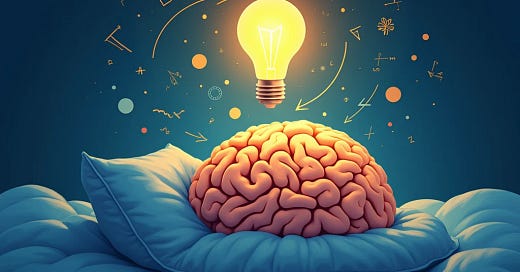Unlock Your Math Genius: The Surprising Sleep Hack for Better Grades
Did you know that getting more sleep could be your secret weapon for acing those math tests? It's not just about feeling refreshed – science shows that sleep can actually make you smarter! Let's dive into how catching those extra Z's can boost your brainpower and help you crush those math problems.
The A+ Sleep Study
Here's a mind-blowing fact: A study from Harvard university found that A-grade students slept about 15 minutes more per night than B students, and a whopping 26 minutes more than C students [1]. That's right – just 15 minutes of extra sleep could be the difference between an A and a B!
How Sleep Supercharges Your Brain
When you sleep, your brain isn't just resting – it's working overtime to help you learn and remember. Here's how:
1. Memory Consolidation: During sleep, your brain strengthens the neural connections formed while studying, helping to cement new information in your long-term memory [3].
2. Problem-Solving Skills: Ever noticed how a tricky math problem seems easier after a good night's sleep? That's because your brain continues to process information and make new connections while you snooze [3].
3. Improved Focus: Well-rested students show better attention spans and can concentrate for longer periods – crucial for tackling those long algebra problems [1]!
4. Faster Reaction Times: Studies have shown that getting enough sleep can improve reaction times by up to 12% [2]. Imagine how quickly you'll be able to solve those rapid-fire math questions!
Sleep Habits of Famous Geniuses
Ever wondered how one of the world's greatest minds approached sleep? Let's take a peek at Albert Einstein's sleep habits:
Einstein, the brilliant physicist behind the theory of relativity, was a big fan of sleep. He reportedly slept for about 10 hours every night! That's more than the average person gets. But Einstein didn't stop there – he also enjoyed taking daytime naps.
This genius was quite liberal when it came to sleep, recognizing its importance for his cognitive function. Maybe all that sleep helped him dream up groundbreaking theories and solve complex mathematical problems. It just goes to show that getting plenty of rest might be a key ingredient in the recipe for genius
!
Tips for Math Geniuses in Training
Ready to boost your brainpower? Try these sleep hacks:
1. Aim for 8-10 hours: Teens need more sleep than adults, so don't skimp [1]!
2. Stick to a schedule: Try to go to bed and wake up at the same time every day, even on weekends [1].
3. Create a sleep-friendly environment: Keep your room dark, quiet, and cool [1].
4. Avoid screens before bed: The blue light from phones and tablets can disrupt your sleep cycle [1].
5. Consider power naps: If you're feeling drowsy during the day, a short 20-minute nap might help – just like Tesla!
Remember, sleep isn't a waste of time – it's an investment in your future math genius! So the next time you're tempted to pull an all-nighter before a big test, think twice. Your brain (and your grades) will thank you for hitting the hay instead.
Go further:
Sweet dreams and happy problem solving!
---
References:
1. Wolfson, A. R., & Carskadon, M. A. (2003). Understanding adolescents' sleep patterns and school performance: a critical appraisal. Sleep Medicine Reviews, 7(6), 491-506.
2. Mah, C. D., Mah, K. E., Kezirian, E. J., & Dement, W. C. (2011). The effects of sleep extension on the athletic performance of collegiate basketball players. Sleep, 34(7), 943-950.
3. Walker, M. P., & Stickgold, R. (2006). Sleep, memory, and plasticity. Annual Review of Psychology, 57, 139-166.




